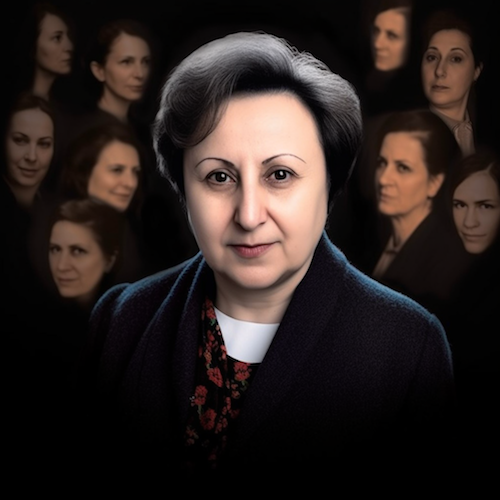¶ Shirin Ebadi: A Nobel for Women’s Rights

¶ Introduction
Shirin Ebadi, born on June 21, 1947, in Hamadan, Iran, is a distinguished Iranian human rights activist, lawyer, and Nobel Laureate renowned for her remarkable achievements in advocating for justice, equality, and human rights within a challenging sociopolitical landscape.
¶ Beginnings
Ebadi's unwavering commitment to human rights led her to pursue a legal career, becoming Iran's first female judges in 1969. However, the Iranian Revolution of 1979 saw her removed from the bench due to her gender, underscoring the struggles she faced in the pursuit of gender equality and justice. Undeterred, she continued to fight for human rights, defending various cases involving women and children.
¶ Nobel Peace Prize
Her tenacity and advocacy earned her the Nobel Peace Prize in 2003, a historic recognition that made her the first Iranian and Muslim woman to receive this esteemed honor. This accolade celebrated her exceptional efforts to expose human rights abuses, promote freedom of speech, and challenge discriminatory practices within Iran.
In November 2009, her Nobel Peace Prize medal and diploma were confiscated by the Iranian government. After this episode, she went into exile in London after facing increasing persecution by the Iranian government. Ebadi was barred from running for president of Iran. She also faced a number of other restrictions, including travel bans and the closure of her offices. In exile, she continues her activism, utilizing her international platform to shed light on the human rights situation in Iran.
Throughout her career, Shirin Ebadi's courage and resilience have remained steadfast, as she confronted threats to her safety and well-being. Her advocacy extended to co-founding the Defenders of Human Rights Center in Iran, a non-profit organization dedicated to promoting human rights education and defending activists and victims of abuse. Beyond her legal work, she has authored books and delivered lectures on human rights, leaving an indelible mark on the global discourse on justice and equality.
Shirin Ebadi's life and work underscore the power of one individual's unwavering dedication to catalyze transformative change. Her relentless advocacy, recognition as a Nobel Laureate, and her decision to stand firm even in the face of exile serve as an inspiration to aspiring activists worldwide.
“The luck I had was that I was born into a very good family. We were three daughters and one brother. All the freedoms my brother had, I had. There was no difference between us. My father loved my mother very much. He was a real feminist – I learned feminist principles from my father really. They were Muslim and they practiced very modern Islam. And we went to Zoroastrian school. Why did we? Because it was a good school near us and my father said there is no reason to go far to go to another good school. He said all religions are one. And I learned from my family to respect all religions.”
¶
¶ FAQs
¶ Q: What are the main facts about Shirin Ebadi?
- She was the first female judge in Iran.
- She was forced to resign from her position as a judge after the Iranian Revolution in 1979.
- She was imprisoned for 11 days in 2000 for her criticism of the Iranian government.
- Her Nobel Peace Prize medal and diploma were confiscated by the Iranian government in 2009.
- She is a strong advocate for the rights of women and children.
- She has founded a number of organizations to promote human rights, including the Ebadi Foundation and the Defenders of Human Rights Center.
- She is a powerful voice for democracy and human rights in Iran.
- She filed a lawsuit against the government of The United States (and won).
¶ Q: What was Shirin Ebadi's motivation for her work?
A: Shirin Ebadi was motivated by her belief in the fundamental human rights of all people, regardless of their gender, religion, or ethnicity. She was also motivated by her own experiences as a woman in Iran, where she saw firsthand the discrimination and oppression that women faced.
¶ Q: What are some of the challenges that Shirin Ebadi has faced in her work?
A: Shirin Ebadi has faced a number of challenges in her work, including:
- Persecution by the Iranian government
- Imprisonment
- Confiscation of her Nobel Peace Prize medal and diploma
- Death threats
- Travel bans
¶ Q: Why did Shirin Ebadi file a lawsuit against the government of the United States?
Shirin Ebadi filed a lawsuit against the government of the United States in 2004 because of restrictions she faced over publishing her memoir in the United States. American trade laws prohibit writers from embargoed countries. The law also banned American literary agent Wendy Strothman from working with Ebadi.
Ebadi argued that the law violated her First Amendment rights and the First Amendment rights of American readers. She also argued that the law was discriminatory, as it only applied to writers from Iran, Cuba, and Sudan.
In 2006, a federal judge ruled in Ebadi's favor, saying that the law violated her First Amendment rights. The government appealed the ruling, but the appeal was later dismissed.
Ebadi's lawsuit was a major victory for human rights and free speech. It showed that the United States government cannot use its trade laws to censor the voices of people from other countries.
Sources